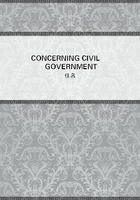
第44章
171. Secondly, political power is that power which every man having in the state of Nature has given up into the hands of the society, and therein to the governors whom the society hath set over itself, with this express or tacit trust, that it shall be employed for their good and the preservation of their property. Now this power, which every man has in the state of Nature, and which he parts with to the society in all such cases where the society can secure him, is to use such means for the preserving of his own property as he thinks good and Nature allows him; and to punish the breach of the law of Nature in others so as (according to the best of his reason) may most conduce to the preservation of himself and the rest of mankind; so that the end and measure of this power, when in every man's hands, in the state of Nature, being the preservation of all of his society- that is, all mankind in general- it can have no other end or measure, when in the hands of the magistrate, but to preserve the members of that society in their lives, liberties, and possessions, and so cannot be an absolute, arbitrary power over their lives and fortunes, which are as much as possible to be preserved; but a power to make laws, and annex such penalties to them as may tend to the preservation of the whole, by cutting off those parts, and those only, which are so corrupt that they threaten the sound and healthy, without which no severity is lawful. And this power has its original only from compact and agreement and the mutual consent of those who make up the community.
172. Thirdly, despotical power is an absolute, arbitrary power one man has over another, to take away his life whenever he pleases; and this is a power which neither Nature gives, for it has made no such distinction between one man and another, nor compact can convey. For man, not having such an arbitrary power over his own life, cannot give another man such a power over it, but it is the effect only of forfeiture which the aggressor makes of his own life when he puts himself into the state of war with another. For having quitted reason, which God hath given to be the rule betwixt man and man, and the peaceable ways which that teaches, and made use of force to compass his unjust ends upon another where he has no right, he renders himself liable to be destroyed by his adversary whenever he can, as any other noxious and brutish creature that is destructive to his being.
And thus captives, taken in a just and lawful war, and such only, are subject to a despotical power, which, as it arises not from compact, so neither is it capable of any, but is the state of war continued. For what compact can be made with a man that is not master of his own life? What condition can he perform? And if he be once allowed to be master of his own life, the despotical, arbitrary power of his master ceases. He that is master of himself and his own life has a right, too, to the means of preserving it; so that as soon as compact enters, slavery ceases, and he so far quits his absolute power and puts an end to the state of war who enters into conditions with his captive.
173. Nature gives the first of these- viz., paternal power to parents for the benefit of their children during their minority, to supply their want of ability and understanding how to manage their property. (By property I must be understood here, as in other places, to mean that property which men have in their persons as well as goods.) Voluntary agreement gives the second- viz., political power to governors, for the benefit of their subjects, to secure them in the possession and use of their properties. And forfeiture gives the third- despotical power to lords for their own benefit over those who are stripped of all property.
174. He that shall consider the distinct rise and extent, and the different ends of these several powers, will plainly see that paternal power comes as far short of that of the magistrate as despotical exceeds it; and that absolute dominion, however placed, is so far from being one kind of civil society that it is as inconsistent with it as slavery is with property. Paternal power is only where minority makes the child incapable to manage his property; political where men have property in their own disposal; and despotical over such as have no property at all.